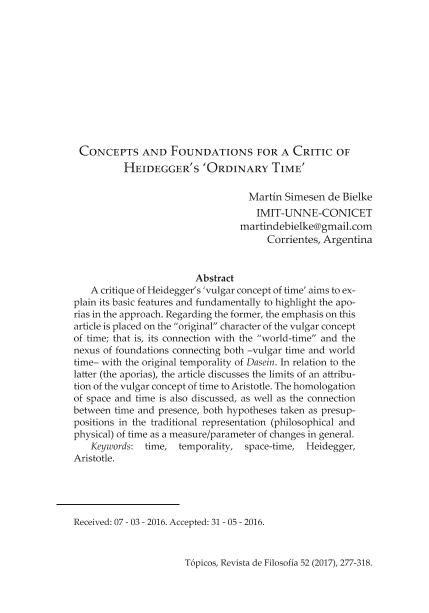Mostrar el registro sencillo del ítem
dc.contributor.author
Simesen de Bielke, Martín Miguel

dc.date.available
2018-05-21T19:38:59Z
dc.date.issued
2016-12
dc.identifier.citation
Simesen de Bielke, Martín Miguel; Concepts and Foundations for a Critic of Heidegger’s "Ordinary Time"; Centros Culturales de México. Universidad Panamericana; Tópicos; 52; 12-2016; 277-318
dc.identifier.issn
2007-8498
dc.identifier.uri
http://hdl.handle.net/11336/45802
dc.description.abstract
Una crítica del concepto vulgar de tiempo busca explicitar los caracteres básicos de dicho concepto y fundamentalmente las aporías en el planteo. Con relación a lo primero, este artículo pone énfasis en el carácter “originario” del concepto vulgar, es decir, su conexión con el “tiempo del mundo” y en el nexo de fundamentación que conecta ambos –tiempo vulgar y tiempo del mundo– con la temporalidad originaria del Dasein. En relación con lo segundo (las aporías), el artículo cuestiona los límites de una atribución del concepto vulgar de tiempo a Aristóteles; se discute asimismo la homologación de espacio y tiempo, por un lado, y la relación entre tiempo y presencia por otro, dos presupuestos de la representación tradicional (física y filosófica) del tiempo como medida/parámetro de los cambios en general.
dc.description.abstract
A critique of Heidegger’s ‘vulgar concept of time’ aims to explain its basic features and fundamentally to highlight the aporias in the approach. Regarding the former, the emphasis on this article is placed on the “original” character of the vulgar concept of time; that is, its connection with the “world-time” and the nexus of foundations connecting both –vulgar time and world time– with the original temporality of Dasein. In relation to the latter (the aporias), the article discusses the limits of an attribution of the vulgar concept of time to Aristotle. The homologation of space and time is also discussed, as well as the connection between time and presence, both hypotheses taken as presuppositions in the traditional representation (philosophical and physical) of time as a measure/parameter of changes in general.
dc.format
application/pdf
dc.language.iso
spa
dc.publisher
Centros Culturales de México. Universidad Panamericana
dc.rights
info:eu-repo/semantics/openAccess
dc.rights.uri
https://creativecommons.org/licenses/by-nc-sa/2.5/ar/
dc.subject
Tiempo
dc.subject
Temporalidad
dc.subject
Espacio-Tiempo
dc.subject
Heidegger, Aristóteles
dc.subject.classification
Estudios Religiosos

dc.subject.classification
Filosofía, Ética y Religión

dc.subject.classification
HUMANIDADES

dc.title
Concepts and Foundations for a Critic of Heidegger’s "Ordinary Time"
dc.title
Conceptos y fundamentos para una crítica del "tiempo vulgar" en Heidegger
dc.type
info:eu-repo/semantics/article
dc.type
info:ar-repo/semantics/artículo
dc.type
info:eu-repo/semantics/publishedVersion
dc.date.updated
2018-05-21T16:58:52Z
dc.journal.volume
52
dc.journal.pagination
277-318
dc.journal.pais
México

dc.journal.ciudad
D.F.
dc.description.fil
Fil: Simesen de Bielke, Martín Miguel. Consejo Nacional de Investigaciones Científicas y Técnicas. Centro Científico Tecnológico Conicet - Nordeste. Instituto de Modelado e Innovación Tecnológica. Universidad Nacional del Nordeste. Facultad de Ciencias Exactas Naturales y Agrimensura. Instituto de Modelado e Innovación Tecnológica; Argentina
dc.journal.title
Tópicos
dc.relation.alternativeid
info:eu-repo/semantics/altIdentifier/url/http://topicosojs.up.edu.mx/ojs/index.php/topicos/article/view/787
dc.relation.alternativeid
info:eu-repo/semantics/altIdentifier/doi/http://dx.doi.org/10.21555/top.v0i52.787
Archivos asociados
